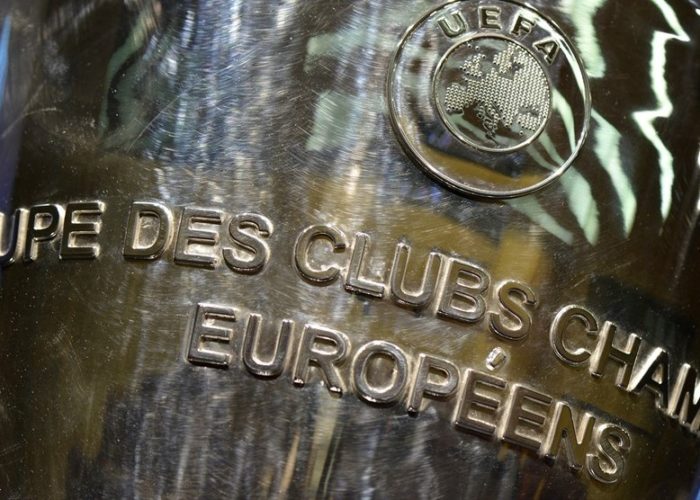Champions League: Minnows Challenge Giants
This season’s Champions League group stage provided football fans with little thrills that one expects from Europe’s elite competition. This has not been a vintage year in the Champions League group stages, representing little more than a box-ticking exercise, with the teams expected to qualify doing so with ease.
Everyone basically knew which teams were going to go through, so even the games between the big teams took on the status of two heavyweight boxers sparring but not fully committing to the fight. If one team didn’t win their two major matches then no matter — they could just win the other four and sail on through. Which is exactly what Arsenal did, drawing twice against Paris Saint-Germain before beating Basel and Ludogorets four times with an aggregate score of 15-3.
In the final game week in the Champions League group stage, round of 16 fixtures, only five had any impact on qualification for the knockout round. In five of the eight groups, the top two were already decided.
Financial monopoly
The massive financial chasm between the elite and the rest has created immensely predictable groups that generally shut out all but the richest clubs. However, this has resulted in a more open and relatively unpredictable knock-out stage, where richest clubs clash against each other. The nuances of knock-out stages and little moments of luck can almost have a bigger effect than the tangible differences between teams. The most well-established sides in Europe have monopolized the competition to such an extent that it usually just comes down to the same three or four teams slogging it out for the title.
Close to nothing, in a competition that used to mean everything. That early tension is gone. You can’t even read too much into results, because the richest teams know they’ll get through. It’s all become one grand continental pre-season.
However, a steady influx of funds through billionaire investors and expensive television rights deal have given more clubs a fighting chance to achieve greatness. If one particularly looks at clubs like Leicester and Leipzig, it’s shrewd transfer business combined with tactical acumen has pushed them to reach for the stars and even get their hands on it. While Leicester’s momentum has come to a screeching halt in the Premier League, their performances in the Champions League suggest they are preserving their energy for European dominion.

Challenging the giants
However, this year brought about an interesting shift in the usual power dynamic fans are used to observing in Europe. The mighty Bayern Munich were trumped by Atletico and minnows FC Rostov. Barcelona were pipped by Manchester City, and holders Real Madrid were troubled by Legia Warsaw. As the dust settled, a fair few teams were left stranded in spots to which they are unaccustomed. However, this only serves to show that there’s a real firecracker of a competition coming up, and spectators should be delighted.
With the emergence of new power players like Atletico Madrid, Paris Saint-Germain and Borussia Dortmund, this European giants have been shaken up. In the domestic leagues, we can already see disruption of power structures.
Whether it’s Leicester City in England or RB Leipzig in Germany, teams are now showing that a little money and a lot of spirit can propel them into the record books. Teams like AC Milan, Liverpool, Manchester United, Chelsea and Inter Milan, who all have rich histories filled with European success, are not even in the Champions League.
A fair few groups had clear winners but there were also those that went to the wire. With Leicester City, Arsenal and Atletico Madrid stepping up to top hard-fought groups, and Borussia Dortmund setting a goalscoring record to lead a group that included an unbeaten Real Madrid, the excitement certainly was not lacking.
Surprise package
Arguably the biggest surprise in the whole first round, of 96 games among elite of European football, was that Borussia Dortmund finished ahead of Real Madrid in their group.
There was the novelty of Leicester, taking their European opponents by surprise and making it through with ample time to spare. The Foxes haven’t enjoyed too much domestic success so far this season and took full advantage of a relatively weak draw in the Champions League. They’re arguably the weakest team on the winners’ side of the draw.
The 3-3 between Manchester City and Celtic was a madcap classic, oscillating this way and that in front of a deafening crowd at Celtic Park. Dortmund’s absurd 8-4 win over Legia Warsaw, in which seven of the goals were scored in the opening 32 minutes.
FC Rostov sure would have enjoyed beating Bayern 3-2.
European giants dominate Champions League

For the traditional European powerhouses of Barcelona, Real Madrid and Bayern Munich, the opening round was a bit of a walkthrough this season.
Unsurprisingly, those three names top the goal charts with Bayern and Real the top scorers on 19 from just six games (an average of over three goals per game).
Cristiano Ronaldo was the top-scoring individual, and broke the record for the most goals by a single player in the group stage with 11 notched.
PSG boasted the tightest defence, conceding just once across their six matches – to Real Madrid defender Nacho at the Santiago Bernabeu. Only Barcelona and Real remain unbeaten.
A peculiar combination of excitement and nervousness will be felt by all the teams, while mouth-watering potential last 16 clashes like Barcelona versus PSG/Bayern or Arsenal versus Bayern/Real Madrid already have both fans and neutrals eagerly awaiting the Round of 16 draw.
For Complete Result and Tables, click here.
Picture Courtesy: UEFA.com, Firstpost, BBC






